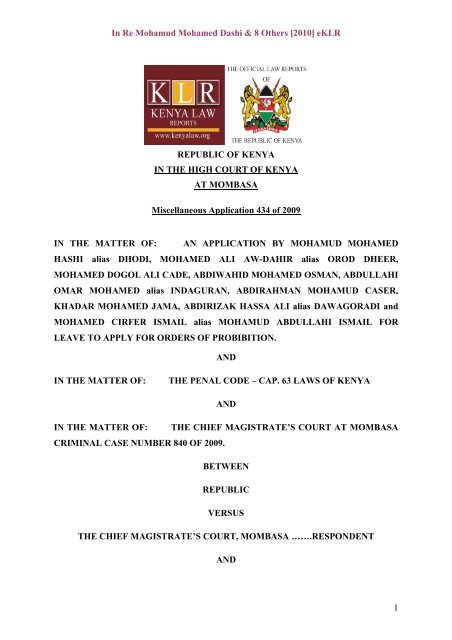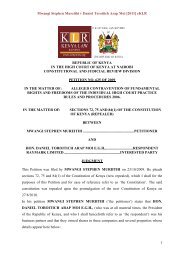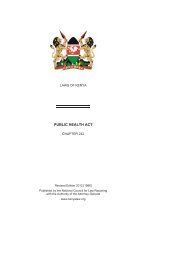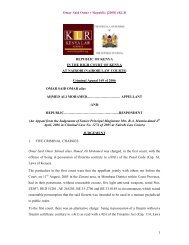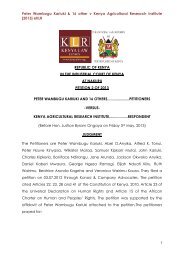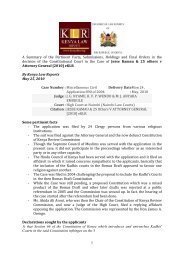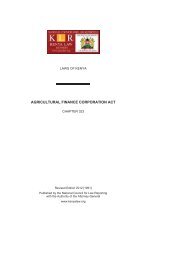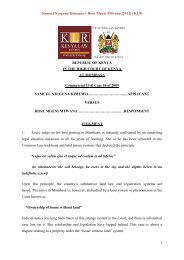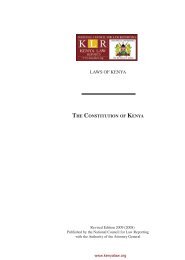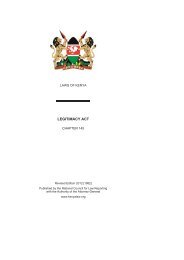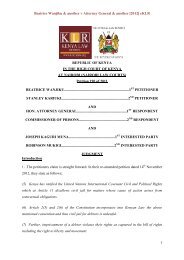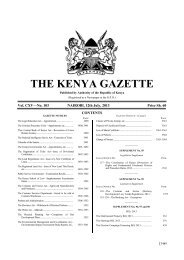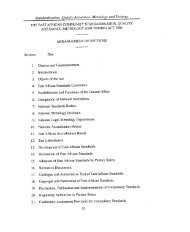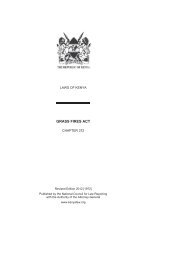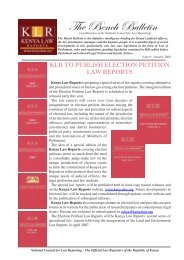In Re Mohamud Mohamed Dashi & 8 Others - Kenya Law Reports
In Re Mohamud Mohamed Dashi & 8 Others - Kenya Law Reports
In Re Mohamud Mohamed Dashi & 8 Others - Kenya Law Reports
You also want an ePaper? Increase the reach of your titles
YUMPU automatically turns print PDFs into web optimized ePapers that Google loves.
<strong>In</strong> <strong>Re</strong> <strong>Mohamud</strong> <strong>Mohamed</strong> <strong>Dashi</strong> & 8 <strong>Others</strong> [2010] eKLR<br />
REPUBLIC OF KENYA<br />
IN THE HIGH COURT OF KENYA<br />
AT MOMBASA<br />
Miscellaneous Application 434 of 2009<br />
IN THE MATTER OF: AN APPLICATION BY MOHAMUD MOHAMED<br />
HASHI alias DHODI, MOHAMED ALI AW-DAHIR alias OROD DHEER,<br />
MOHAMED DOGOL ALI CADE, ABDIWAHID MOHAMED OSMAN, ABDULLAHI<br />
OMAR MOHAMED alias INDAGURAN, ABDIRAHMAN MOHAMUD CASER,<br />
KHADAR MOHAMED JAMA, ABDIRIZAK HASSA ALI alias DAWAGORADI and<br />
MOHAMED CIRFER ISMAIL alias MOHAMUD ABDULLAHI ISMAIL FOR<br />
LEAVE TO APPLY FOR ORDERS OF PROBIBITION.<br />
AND<br />
IN THE MATTER OF:<br />
THE PENAL CODE – CAP. 63 LAWS OF KENYA<br />
AND<br />
IN THE MATTER OF: THE CHIEF MAGISTRATE’S COURT AT MOMBASA<br />
CRIMINAL CASE NUMBER 840 OF 2009.<br />
BETWEEN<br />
REPUBLIC<br />
VERSUS<br />
THE CHIEF MAGISTRATE’S COURT, MOMBASA …….RESPONDENT<br />
AND<br />
1
<strong>In</strong> <strong>Re</strong> <strong>Mohamud</strong> <strong>Mohamed</strong> <strong>Dashi</strong> & 8 <strong>Others</strong> [2010] eKLR<br />
THE ATTORNEY GENERAL ……..………………INTERESTED PARTY<br />
EX-PARTE<br />
MOHAMUD MOHAMED HASHI alias DHODI and EIGHT (8) OTHERS<br />
JUDGEMENT<br />
The Applicants, nine (9) in number were arraigned in the Chief Magistrate’s<br />
Court at Mombasa on 11 th March, 2009 in Criminal Case No. 840 of 2009 and charged with<br />
the offence of Piracy contrary to Section 69 (1) as read with Section 69 (3) of the Penal Code,<br />
Chapter 63 of the <strong>Law</strong>s of <strong>Kenya</strong>.<br />
The Applicants are: -<br />
1. <strong>Mohamud</strong> <strong>Mohamed</strong> Hashi alias Dhodi<br />
2. <strong>Mohamed</strong> Ali aw-Dahir alias Orod Dheer<br />
3. <strong>Mohamed</strong> Dogol Ali Cade<br />
4. Abdiwahid <strong>Mohamed</strong> Osman<br />
5. Abdullahi Omar <strong>Mohamed</strong> alias <strong>In</strong>daguran<br />
6. Abdirahman <strong>Mohamed</strong> Caser<br />
7. Khadar <strong>Mohamed</strong> Jama<br />
8. Abdirizik Hassna Ali alias Dawagoradi<br />
9. <strong>Mohamed</strong> CIRFER ISMAIL alias <strong>Mohamud</strong> Abdullahi Ismail.<br />
The particulars of the offence are that the above-mentioned Accused persons “…. on the<br />
3 rd day of March, 2009 upon the High Seas of <strong>In</strong>dian Ocean jointly being armed with<br />
offensive weapons namely three AK 47 Rifles, one pistol make Tokalev, one RPG – 7<br />
portable Rocket Launcher, one SAR 80 Rifle and one Carabire rifle, attacked a<br />
machine sailing vessel namely MV COURIER and at the time of such act put in fear<br />
the lives of the crew men of the said vessel.”<br />
2
<strong>In</strong> <strong>Re</strong> <strong>Mohamud</strong> <strong>Mohamed</strong> <strong>Dashi</strong> & 8 <strong>Others</strong> [2010] eKLR<br />
All the Accused pleaded not guilty. They made applications for bail through their counsel Mr.<br />
Magolo. It was opposed by the State through the Assistant Director of Public Prosecutions,<br />
Mr. Ondari. The trial court refused to release the Applicants on bail pending the trial. The trial<br />
commenced on 27 th April, 2009 before the Honourable Senior <strong>Re</strong>sident Magistrate Ms. T.<br />
Mwangi. The prosecution called 15 witnesses. After hearing the prosecution case and<br />
evaluating the evidence, the Honourable Magistrate placed all the Accused persons on their<br />
defences on 24 th August, 2009. The defence hearing was fixed for 22 nd October, 2009.<br />
It is at this stage that the Accused applied for leave to institute judicial review proceedings for<br />
the above Order of Prohibition. The Chamber summons for leave was filed on 17th<br />
September, 2010. Leave was granted the next day on 18 th September, 2010.<br />
The substantive Notice of Motion dated 23 rd September, 2010 was filed on the said date.<br />
The relief sought by the Applicants: -<br />
1. “An Order of Prohibition, prohibiting the learned<br />
Chief Magistrate Mombasa or any other Magistrate’s<br />
Court under her from hearing, proceeding with, dealing<br />
with, entertaining and/or otherwise allowing the<br />
prosecution of Criminal Case No. 840 of 2009<br />
commenced on 11 th March, 2009.<br />
2. Costs of the Application be provided for.”<br />
The FACTS in the statement which give rise to the Application are stated to be: -<br />
(i) The ex-parte Applicants have been charged<br />
in the Chief Magistrate’s Court with the offence of<br />
Piracy contrary to Section 69 of the Penal Code since<br />
11 th March, 2009.<br />
(ii) Evidence has now been given which clearly<br />
show that the alleged offence took place in the Gulf of<br />
Aden beyond <strong>Kenya</strong> and its Territorial Waters.<br />
3
<strong>In</strong> <strong>Re</strong> <strong>Mohamud</strong> <strong>Mohamed</strong> <strong>Dashi</strong> & 8 <strong>Others</strong> [2010] eKLR<br />
(iii) The Ex-parte Applicants have indicated their<br />
desire to be represented by <strong>Law</strong>yers of their choice but<br />
their said <strong>Law</strong>yers have been denied audience.<br />
(iv) The Ex-parte Applicants have as well been<br />
subjected to discrimination.<br />
(v) The Ex-parte Applicants have as well been<br />
subjected to discrimination including the denial of bail.<br />
(vi) The Ex-parte Applicants cannot possibly<br />
have a fair trial.<br />
The Grounds on which the reliefs are sought are set out in the statutory statement. They are: -<br />
(a) That the <strong>Kenya</strong>n Courts do not have jurisdiction under<br />
section 5 of the Penal Code to try the Applicants.<br />
(b)That evidence has been given that clearly show that the<br />
court has no jurisdiction.<br />
(c) That the facts of lack of jurisdiction has been drawn to<br />
the court’s attention but the court has insisted in proceeding<br />
with the trial.<br />
(d)That the decisions to proceed with the trial is illegal and<br />
in excess of the court’s jurisdiction.<br />
(e) That the Applicants have been denied their rights to have<br />
counsel of their choice and to proceed with the trial is to<br />
condone such denial.<br />
(f) That the continuation of the trial shall clearly prejudice<br />
the Ex-parte Applicants.<br />
(g) That the court is acting without jurisdiction.<br />
4
<strong>In</strong> <strong>Re</strong> <strong>Mohamud</strong> <strong>Mohamed</strong> <strong>Dashi</strong> & 8 <strong>Others</strong> [2010] eKLR<br />
Together with the Chamber summons for leave to file for judicial review Orders, the<br />
applicants filed a Verifying Affidavit as required by the Rules. It was sworn by the First<br />
Applicant MOHAMOUD MOHAMED HASHI alias DHODI on 17 th September, 2009 on his<br />
own behalf and on behalf of the other Applicants having been authorized to do so. The<br />
essential facts deponed in the affidavit are, inter alia, that: -<br />
- The Applicants are currently held at Shimo La Tewa on a<br />
charge of Piracy contrary to Section 69 (1) of the Penal Code.<br />
- After being charged with the offence they were supplied with<br />
the statements from witnesses and they showed that the incident<br />
under inquiry took place at the Gulf of Aden. They annexed a copy<br />
of one such statement made by a witness namely Grahame Anthony<br />
Dick, Naval Officer, U.S. Lieutenant Commander, who was in<br />
Command of Helicopter Aircraft, the MAGNUM 441 on the USS<br />
MONTEREY (C.G 61), a Naval ship. At all material times, the<br />
MAGNUM 441 was flying in the Gulf of Aden.<br />
- They waited and participated in the trial as all prosecution<br />
witnesses testified and confirmed the following: -<br />
(a) That the alleged attack took place in/at the Gulf of Aden.<br />
(b)That at no time did the attack proceed to <strong>Kenya</strong>n waters or<br />
<strong>Kenya</strong>n Territory.<br />
(c) That no <strong>Kenya</strong> goods, crew or ship was involved.<br />
- That through their advocates it was submitted that the court<br />
has no jurisdiction but the court, proceeded to rule that it would<br />
proceed with the trial/case.<br />
- That having been shown and explained the provisions of<br />
Sections, 2, 5 and 6 of the Penal Code together with Part XVI of the<br />
Merchant Shipping Act, they believe that the court had no<br />
jurisdiction over this matter.<br />
5
<strong>In</strong> <strong>Re</strong> <strong>Mohamud</strong> <strong>Mohamed</strong> <strong>Dashi</strong> & 8 <strong>Others</strong> [2010] eKLR<br />
- That they had also sought to secure the services of their<br />
preferred lawyers, but the Hon. Attorney General who is the<br />
Prosecutor refused to grant them leave to retain the said lawyers.<br />
The applicants produced in the court a letter dated 4 th April, 2009 written by their<br />
<strong>Kenya</strong>n Advocate, Mr. Jared Magolo, in which the Applicants asked for the<br />
Attorney General’s consent to allow them to be represented by 4 <strong>Law</strong>yers<br />
practicing in Germany, namely Mr. Oliver Wallasch, Mr. Michael Koch, Mr.<br />
Andreas Schulz and Mr. Markus Goldback. By a letter dated 16 th April, 2009, the<br />
Attorney General replied ad stated that Mr. Magolo had not given all facts that are<br />
necessary to enable him consider the request like the particulars of the 4 Germany<br />
– based lawyers and what special knowledge or skill they have in this case which<br />
cannot be readily handled by an advocate admitted to practice in <strong>Kenya</strong>.<br />
- That the trial is prejudicial to the Applicants.<br />
The attorney General as counsel for the <strong>Re</strong>spondent, the Chief Magistrate’s Court, Mombasa<br />
did not file any replying affidavit or Grounds of Opposition but notified the court that the<br />
<strong>Re</strong>spondent would oppose the Application. <strong>In</strong> judicial review proceedings a respondent and/or<br />
any <strong>In</strong>terested Party may participate in the proceedings and respond by way of submissions at<br />
the hearing.<br />
At the hearing, the applicants were represented by Mr. Jared Magolo Advocate while<br />
the <strong>Re</strong>spondent was represented by Mr.Ondari Assistant director of Public Prosecution.<br />
Mr. Magolo at the start informed the court that the applicants would not pursue any<br />
Constitutional issues raised in the application and would confine themselves to judicial review<br />
questions only. The Applicants also abandoned to raise any issue in respect of their desire to<br />
be represented by Foreign <strong>Law</strong>yers. This, therefore, in effect left what is really the true and<br />
substantive question to be determined by the High Court in this judicial <strong>Re</strong>view Proceedings,<br />
to wit: -<br />
Whether the Chief Magistrate’s Court had jurisdiction to<br />
try the charges against the Applicants in this case and also<br />
6
<strong>In</strong> <strong>Re</strong> <strong>Mohamud</strong> <strong>Mohamed</strong> <strong>Dashi</strong> & 8 <strong>Others</strong> [2010] eKLR<br />
over the Applicants. Simply, did the court have jurisdiction<br />
over the matter before it?<br />
Mr. Magolo made submissions in support of the application which are on record. He<br />
also submitted that: -<br />
- The only law applicable in this case at the close of the<br />
Prosecution’s case was Section 69 (1) and (3) of the Penal Code.<br />
- That while it was a fact that the entire Section 69 of the Penal<br />
Code was repealed by virtue of Section 454 of the Merchant<br />
Shipping Act, which came into force during the pendency of this<br />
case on 1 st September, 2009, and a new provision in respect of<br />
Piracy came into force through Section 371, yet there had been no<br />
amendment of the charge as may have been required by virtue of<br />
Section 214 of the Criminal Procedure Code before the close of the<br />
prosecution case.<br />
- The prosecution had closed its case and no application for<br />
amendment had been made. As a result, the law applicable and<br />
being used to prosecute the Applicants was Section 69 (1) of the<br />
Penal Code.<br />
- The place where the incident occurred was in the Gulf of Aden<br />
which is in “the High Seas” between Somalia in Africa and Yemen<br />
in the Arabian Peninsula.<br />
- That the offence alleged was committed outside the territorial<br />
jurisdiction of <strong>Kenya</strong> and outside the <strong>Kenya</strong>n waters.<br />
- That neither a <strong>Kenya</strong>n citizen or <strong>Kenya</strong> property was involved.<br />
- The arrest was made by the German Navy taking part in<br />
operations in the Gulf of Aden.<br />
- The arresting officer was not a <strong>Kenya</strong>n and there was no nexus<br />
or <strong>Kenya</strong>n connection.<br />
7
<strong>In</strong> <strong>Re</strong> <strong>Mohamud</strong> <strong>Mohamed</strong> <strong>Dashi</strong> & 8 <strong>Others</strong> [2010] eKLR<br />
- That jurisdiction could only be conferred by written law, namely,<br />
the <strong>Kenya</strong> Constitution, the Judicature Act and the Magistrate’s<br />
Court Act.<br />
- That the jurisdiction of the Courts of <strong>Kenya</strong> is donated by section<br />
5 of the Penal Code and this extends to places within <strong>Kenya</strong><br />
including territorial waters.<br />
- The legislation denies the <strong>Kenya</strong>n Courts jurisdiction to deal<br />
with offences committed outside the <strong>Kenya</strong>n territory.<br />
- If the Penal Code confers jurisdiction to the country’s territorial<br />
waters then on what legal basis did the court extends its jurisdiction<br />
to offences committed in the High Seas?<br />
- Section 6 of the Penal Code confers jurisdiction on the local<br />
courts where offences are committed partly within and partly<br />
beyond or outside the jurisdiction of the courts and the person<br />
alleged to have committed the offence is within the jurisdiction of<br />
the courts in <strong>Kenya</strong>.<br />
- That the enactment of the Merchant Shipping Act and<br />
operationalisation on 1 st September, 2009 do not affect the<br />
Applicants.<br />
- That if the courts had jurisdiction before then why did<br />
Parliament pass the new law?<br />
- The court is proceeding without jurisdiction.<br />
Counsel for the Applicants in conclusion urged this court to direct the Magistrate’s<br />
Court that it had no jurisdiction in the case and as a consequence the High Court do issue an<br />
Order of Prohibition.<br />
Mr. Ondari, the Assistant director of Public Prosecutions on his part as counsel for the<br />
<strong>Re</strong>spondent submitted inter alia, as follows: -<br />
8
<strong>In</strong> <strong>Re</strong> <strong>Mohamud</strong> <strong>Mohamed</strong> <strong>Dashi</strong> & 8 <strong>Others</strong> [2010] eKLR<br />
- That the Applicants have not referred to any legislation<br />
prohibiting the Magistrate’s Court considering the case and that<br />
indeed the court had appropriate jurisdiction and was competent to<br />
try the case – Section 69 of the Penal Code, Chapter 63, <strong>Law</strong>s of<br />
<strong>Kenya</strong>.<br />
- That the charge of Piracy here was Piracy “Jure Gentium”and<br />
was different from a charge of Piracy by statute, per se.<br />
- Piracy Jure Gentium is defined in Section 4 of the Offences<br />
Against Crown and Government Chapter 12 of <strong>Law</strong>s of the United<br />
Kingdom. That the offence is against the <strong>Law</strong> of Nations”. It can<br />
be punished by any state or jurisdiction.<br />
- That even landlocked countries can deal with “Piracy Jure<br />
Gentium”. One does not have to have territorial waters or a<br />
coast/coastal line to prosecute this offence as it is a crime against all<br />
Nations and Humanity.<br />
- That there is no requirement to prove any nexus between the<br />
offender and the offended.<br />
- That Section 69 of the Penal Code gives “Universal”<br />
jurisdiction to the Magistrate’s Court of First Class in <strong>Kenya</strong>.<br />
- That Section 69 of the Penal Code ought to be construed and<br />
interpreted in the context of the title of Chapter 8 under which it is<br />
enacted, namely: -<br />
“CHAPTER VIII – OFFENCES<br />
AFFECTING RELATIONS WITH<br />
FOREIGN STATES AND EXTERNAL<br />
TRANQUILITY.”<br />
- That in effect, the objectives of the legislation ought to be taken<br />
into account when interpreting Section 69 of the Penal Code and<br />
9
<strong>In</strong> <strong>Re</strong> <strong>Mohamud</strong> <strong>Mohamed</strong> <strong>Dashi</strong> & 8 <strong>Others</strong> [2010] eKLR<br />
the intention must have been the extention of jurisdiction to<br />
incidents in the High Seas outside local or territorial jurisdiction.<br />
- That the court ought to read and apply the provisions of Sections<br />
2 (b), 5 and 6 together of the Code. Section 2 (b) provides that<br />
nothing in the Penal Code shall affect the trial and punishment of<br />
any person under any law in force in <strong>Kenya</strong> relating to the<br />
jurisdiction of the courts of <strong>Kenya</strong> for an offence or an act done<br />
beyond the ordinary jurisdiction of such courts.<br />
- That in connection with the above, that by virtue of the<br />
Judicature Act, Chapter 8, <strong>Law</strong>s of <strong>Kenya</strong>, the Section 3 (1) (b) and<br />
the Schedule thereto in Part 1 and Part II, the <strong>Kenya</strong>n Courts have<br />
jurisdiction to invoke and apply the Admiralty Offences (Colonial)<br />
Act, 1849 and this Act applies to <strong>Kenya</strong>. That section 1 of the said<br />
Act in effect confers jurisdiction to the Magistrates Court to try the<br />
charge of piracy committed in the High Seas.<br />
- Under the provisions of the <strong>In</strong>terpretation and General<br />
Provisions Act, Chapter 2, <strong>Law</strong>s of <strong>Kenya</strong>, despite the repeal of<br />
Section 69 of the Penal Code, it has been saved by Section 23 (3)<br />
(e) and the court has the jurisdiction and power to continue with the<br />
present case to its conclusion/finality.<br />
- That the charge relates to substantive law and not procedural<br />
law.<br />
- That under Section 4 of the Criminal Procedure Code, the<br />
offence of piracy is to be tried by the Subordinate Court of the First<br />
Class, presided over by a Chief Magistrate, a senior Principal<br />
Magistrate, a Principal Magistrate or a Senior <strong>Re</strong>sident Magistrate.<br />
- That the issue of the Magistrate’s Court’s jurisdiction in<br />
considering cases of piracy was raised in a previous High Court<br />
Appeals, to wit, HIGH COURT APPEAL NOS. 198 – 207 OF<br />
10
<strong>In</strong> <strong>Re</strong> <strong>Mohamud</strong> <strong>Mohamed</strong> <strong>Dashi</strong> & 8 <strong>Others</strong> [2010] eKLR<br />
2008 (as consolidated) – HASSAN M. AHMED AND OTHERS<br />
– V – REPUBLIC (MOMBASA) in which the High Court<br />
dismissed the appeal on among others, the ground of want of<br />
jurisdiction. The High Court on 12 th May, 2009 upheld the<br />
convictions and sentences in respect of the charges of piracy in the<br />
High Seas.<br />
- That the application herein for prohibition has been filed after 15<br />
witnesses had testified and the prosecution had closed its case and it<br />
was belated and there was inordinate and inexcusable delay.<br />
- That circumstances existed which precluded the grant of<br />
relief. <strong>Re</strong>lying on “De Smith’s Judicial <strong>Re</strong>view of Administrative<br />
Action” 4 th Edition, P. 422, Mr. Ondari referred to the following<br />
circumstances: -<br />
(i)<br />
Conduct of the Applicant<br />
That the remedy of Prohibition is in general, a<br />
discretionary remedy and the conduct of the<br />
applicants should disentitle them to a<br />
remedy. That the Applicants went through with<br />
the prosecution case. Witness statements were<br />
supplied and the case is over half-way through<br />
and they have waiver their right to object to a<br />
jurisdictional defect. They have lost any right to<br />
prohibition by acquiescence or waived by<br />
conduct.<br />
- That there has been unreasonable delay in making the application<br />
for judicial review. That the court should find that the grant of the<br />
Order would cause substantial hardship or prejudice or be<br />
detrimental to Good administration.<br />
- That the case had reached the defence stage and is at an end.<br />
11
<strong>In</strong> <strong>Re</strong> <strong>Mohamud</strong> <strong>Mohamed</strong> <strong>Dashi</strong> & 8 <strong>Others</strong> [2010] eKLR<br />
- That the expeditious hearing was taken at the insistence of the<br />
Applicants.<br />
- On the issue of amendment of the charge upon the repeal of<br />
Section 69, Penal Code and enactment of the Merchant Shipping<br />
Act, as stated above he relied upon Section 23 (3) (e) of the<br />
<strong>In</strong>terpretation and General Provision’s Act. That the new law was a<br />
Consolidating Act passing the offence of piracy by statute in<br />
conformity with the provisions of the United Nations Convention<br />
on the <strong>Law</strong> of the Sea (hereinafter referred to as<br />
‘UNCLOS’. However, this did not mean that the court did not have<br />
jurisdiction as it had that in respect of Piracy Jure Gentium.<br />
Counsel for the <strong>Re</strong>spondent called upon this court to dismiss the application as it<br />
lacked merits. He submitted that the trial do proceed to its logical conclusion.<br />
<strong>In</strong> his reply, Mr. Magolo submitted further that: -<br />
- There was no proof that the “Colony” envisaged in the<br />
Admiralty offences (Colonial) Act, 1849 envisaged the “<strong>Re</strong>public<br />
of <strong>Kenya</strong>”.<br />
- That if the provisions of the Admiralty offences (Colonial) Act<br />
were applicable then it was mandatory that the said provisions<br />
therein be set out and included in the charge sheet. That it cannot be<br />
implied or imported by submissions by counsel in these<br />
proceedings.<br />
- That the charge sheet did not refer to “High Seas” in the offence<br />
as envisaged by Section 6 of the Penal Code.<br />
- That there was no partial commission of the offence in <strong>Kenya</strong>.<br />
- Decision in HASSAN M. AHMED & OTHERS – VS –<br />
REPUBLIC,dwelt on with Section 69 of the Penal Code and not<br />
12
<strong>In</strong> <strong>Re</strong> <strong>Mohamud</strong> <strong>Mohamed</strong> <strong>Dashi</strong> & 8 <strong>Others</strong> [2010] eKLR<br />
Sections 5 and 6. It was distinguishable on the facts and<br />
circumstances.<br />
The foregoing fairly outlines and sets out the background to this application, the<br />
questions in issue and the arguments and presentations by the parties through their respective<br />
counsel.<br />
I have carefully considered the application together with the Statutory Statement,<br />
Verifying Affidavit, application for leave, the submissions by counsel, the statutes and<br />
authorities submitted to court.<br />
The applicants are charged with the offence of Piracy contrary to Section 69 (1) as<br />
read with section 69 (3) of the Penal Code; chapter 63, <strong>Law</strong>s of <strong>Kenya</strong>. Section 69 (1)<br />
provides as follows: -<br />
“69. (1) any person who in territorial waters or upon the<br />
high seas, commits any act of piracy jure gentium is guilty of<br />
the offence of Piracy.<br />
…………………………………………………………………<br />
…..”<br />
The offence was included in the Penal Code by Act 24 of 1967 – in section 6. The<br />
Penal Code first came into effect before <strong>Kenya</strong>’s independence when it was a Colony in<br />
1930. Section 69 (3), provides for the sentence for offence of Piracy. It reads as follows: -<br />
“69. (3) any person who is guilty of the offence of piracy is<br />
liable to imprisonment for life.”<br />
<strong>In</strong> the charge sheet, it is stated that the alleged offence took place on 3 rd day of March,<br />
2009 upon the High Seas of the <strong>In</strong>dian Ocean. <strong>In</strong> the 1 st Applicant’s affidavit he deponed that<br />
from the statements of witnesses and the prosecution witnesses the alleged act/s of piracy took<br />
place in the Gulf of Aden in the <strong>In</strong>dian Ocean. By the close of the prosecution case having<br />
called 15 witnesses, it became certain that the place where the alleged incident under inquiry<br />
took place was in the Gulf of Aden.<br />
13
<strong>In</strong> <strong>Re</strong> <strong>Mohamud</strong> <strong>Mohamed</strong> <strong>Dashi</strong> & 8 <strong>Others</strong> [2010] eKLR<br />
By the time the Applicants filed this application, they had been placed on their<br />
defences but had not commenced the same. The proceedings or trial was ordered to be stayed<br />
by this Court pending the hearing and determination of this application as it raised<br />
jurisdictional issues and by its nature and remedy sought. As a result, for the purposes of this<br />
application, it must be deemed which I do that the offence took place if it did in the Gulf of<br />
Aden, in the lndian Ocean. This is the place set out in the charge sheet and established by the<br />
prosecution to date.<br />
The charge sheet in its particulars states that the offence took place on “… 3 rd day of<br />
March, 2009 upon the High Seas of <strong>In</strong>dian Ocean, …”<br />
From the foregoing, it can be said to be undisputed or a non-issue in this application<br />
that the alleged offence of Piracy jure gentium” was not committed in territorial waters<br />
within the territorial jurisdiction of the <strong>Kenya</strong>n Courts.<br />
The next question was the offence committed in the “HIGH SEAS”. Where are the<br />
High seas and what is their legal definition?<br />
<strong>In</strong> preparation of this judgement, I relied intensively on the legal materials supplied to<br />
the court by the two counsels on record, i.e. the pleadings, statutes, case law, and text books. I<br />
also relied on their elaborate, incisive and enlightening submissions. I am sincerely grateful to<br />
their industry and articulation of the facts, issues and respective client’s cases. I would<br />
perhaps have been lost in some high sea with my limited experience in Admiralty and Piracy<br />
jurisprudence. Any inadequecies in this judgement is not for any omission on their part for<br />
they each gave an excellent account of themselves.<br />
The question of jurisdiction to try cases by the <strong>Kenya</strong>n Courts has not been the subject<br />
of much judicial interpretation and very few cases are reported on the subject. This scarcity in<br />
judicial interpretation is explained by the fact that until very recently the <strong>Kenya</strong>n Courts did<br />
not try piracy cases with the first reported case heard by courts in 2006. However, I am<br />
obliged to place it on record that I was fortunate and privileged to have access to Legal Papers<br />
presented by <strong>Kenya</strong>n Legal Scholars, Legal Practitioners and Jurists. I had the benefit of<br />
writings of possibly the leading legal expert and source on Maritime <strong>Law</strong> in <strong>Kenya</strong>, Dr. Paul<br />
Musili Wambua Ph D (Gent), Lecturer in Maritime and Commercial <strong>Law</strong> at the University of<br />
Nairobi and which I intend to refer to shortly. I also had the benefit of a legal paper presented<br />
14
<strong>In</strong> <strong>Re</strong> <strong>Mohamud</strong> <strong>Mohamed</strong> <strong>Dashi</strong> & 8 <strong>Others</strong> [2010] eKLR<br />
by Mr. Francis O. Kadima Advocate – “The Legal Challenges of Prosecuting Suspected<br />
Pirates in the <strong>Re</strong>gion” at the regional Meeting of Judges on Environmental Security in East<br />
Africa held in Victoria, Seychelles between 30 th November – 2 nd December, 2009, and at<br />
which I had the privilege to be one of the representatives of the <strong>Kenya</strong> Judiciary. It will be<br />
incomplete not to mention that I also considered the useful presentations made by the Hon.<br />
Justice of Appeal, Mr. Justice Onyango Otieno, Mr. Makaloo, Advocate and Dr. Kithure<br />
Kindiki at aforesaid workshop in Seychelles.<br />
<strong>In</strong> his paper referred to above Mr. Francis Kadima observed as follows: -<br />
“…………………………………………………………………<br />
……………<br />
Under the repealed <strong>Kenya</strong>n law, any person, who in<br />
territorial waters, or in the High Seas, commits any act of<br />
piracy jure gentium is guilty of the offence of piracy. Though<br />
<strong>Kenya</strong>n territorial waters is defined/known as 640 km<br />
Coastline North eastern bordering Somalia South borders<br />
Tanzania and 14 nautical miles from Coastline towards the<br />
<strong>In</strong>dian Ocean (eastern side of <strong>Kenya</strong>), the High Seas is not<br />
defined in the repealed Merchant Shipping Act, Penal Code<br />
or even the interpretation and General Provisions Act. It is<br />
only after the domestication of the UNCLOS in the new Act<br />
that the High Seas has been defined.<br />
………………………………………………………………..”<br />
Dr. Paul M. Wambua in a paper – Maritime Security; Issues in Piracy and<br />
Terrorism a lecture delivered for the Foregn Servce <strong>In</strong>stitute in Mombasa on 30 th April, 2010<br />
of the High Seas defined in UNCLOS: -<br />
“………………………………………………………<br />
Combating maritime insecurity is made very difficult by the<br />
vastness of the ocean and the fact that no single state has the<br />
responsibility/obligation to police and secure the maritime<br />
15
<strong>In</strong> <strong>Re</strong> <strong>Mohamud</strong> <strong>Mohamed</strong> <strong>Dashi</strong> & 8 <strong>Others</strong> [2010] eKLR<br />
domain forming the High Seas. The jurisdiction of states<br />
over the maritime domain is determined in accordance with<br />
particular maritime zones. Maritime offences are also<br />
classified according to the maritime zones.<br />
…………………………………………………….<br />
There are five main zones recognized by United Nations<br />
Convention on the <strong>Law</strong> of the Sea (UNCLOS) namely;<br />
<strong>In</strong>ternal Waters, Territorial Sea, the Contiguous Zone; the<br />
Exclusive Economic Zone, the Continental shelf and the<br />
High Seas.<br />
(a) - ………………………………………………….<br />
(b)- ………………………………………………….<br />
(c) - ………………………………………………….<br />
(d)- …………………………………………………..<br />
(e) The High seas<br />
· The High Seas are all parts of the sea that are<br />
not included in the Exclusive Economic Zone<br />
(EEZ), in the Territorial Sea or in the <strong>In</strong>ternal<br />
Waters of a state; or in the archipelago waters of<br />
an archipelagic state. <strong>In</strong> other words the High<br />
Seas are the equivalent of “nomans land”; the<br />
High Seas are open to all states. The basic<br />
principle is the “mare libertum” theory<br />
developed by Hugo Grotius, a Dutch scholar.<br />
Article 89 of UNCLOS provides that no state may<br />
validly purport to subject any part of the High<br />
seas to its sovereignity ….”<br />
16
<strong>In</strong> <strong>Re</strong> <strong>Mohamud</strong> <strong>Mohamed</strong> <strong>Dashi</strong> & 8 <strong>Others</strong> [2010] eKLR<br />
From the foregoing, I form the opinion that our laws under which the Applicants are<br />
charged does not provide for an express definition of what constitutes “the High seas”. One<br />
can only deduce what it may refer to by exclusionary interpretation, deduction and<br />
logic. What can be stated with certainty is that the High Seas as contemplated by section 69<br />
(1) excludes, territorial waters. <strong>In</strong> other words, the High Seas are outside the territorial<br />
jurisdiction of the <strong>Kenya</strong>n Courts.<br />
This brings me to the main question for determination in this judicial review<br />
application –<br />
Do the <strong>Kenya</strong>n Courts have jurisdiction to try the charges against the Applicants<br />
in this case?<br />
Jurisdiction of the Local Courts to adjudicate on all matters under the Penal Code is<br />
given by Section 5 of the Penal Code which reads that: -<br />
“5. The jurisdiction of the Courts of <strong>Kenya</strong> for the purpose<br />
of this Code extends to every place within <strong>Kenya</strong>, including<br />
territorial waters.” (Emphasis mine)<br />
From what this court has discussed above I do hold that the <strong>Kenya</strong>n Courts are not<br />
conferred with or given any jurisdiction to deal with any matters arising or which have taken<br />
place outside <strong>Kenya</strong>. The <strong>Kenya</strong>n Courts have no jurisdiction in criminal cases and in<br />
particular in the offences set out in the Penal Code where the alleged incident or offence took<br />
place outside the geographical area covered by the <strong>Kenya</strong> state or the <strong>Re</strong>public of <strong>Kenya</strong>. The<br />
Local Courts can only deal with offences or criminal incidents that take place within the<br />
territorial jurisdiction of <strong>Kenya</strong>.<br />
The High Seas are not and cannot be a place in <strong>Kenya</strong> or within the territorial waters<br />
of <strong>Kenya</strong>. <strong>In</strong> fact by definition they are strictly deemed to be outside the jurisdiction of all<br />
states in the world or on earth unless some law in the state brings it into their local jurisdiction<br />
whether Municipal <strong>Law</strong> or an <strong>In</strong>ternational Convention etc.<br />
For the purpose of the case, the exact area or locality where the incident or offence<br />
took place was in the High Seas in the Gulf of Aden in the <strong>In</strong>dian Ocean. This is a matter of<br />
fact on the basis of the evidence of the prosecution after closing its case. This factual aspect is<br />
17
<strong>In</strong> <strong>Re</strong> <strong>Mohamud</strong> <strong>Mohamed</strong> <strong>Dashi</strong> & 8 <strong>Others</strong> [2010] eKLR<br />
not disputed and in any case cannot be disputed before any rebuttal by the defence after their<br />
hearing of their defence of the case reaches that stage. <strong>In</strong> fact, to the contrary, the Applicants<br />
appeared to rely on this fact and do not intend to challenge the statement in the charge sheet<br />
that the incident took place in the High Seas of the <strong>In</strong>dian Ocean.<br />
A natural and ordinary interpretation of Section 5 of the Penal Code is that the<br />
Magistrate’s Court in Criminal Case No. 840 of 2004 lacked jurisdiction to try the Applicants<br />
in respect of the charge of piracy under section 69 (1) of the Penal Code. The said Court had<br />
no jurisdiction over the matter when the charges were preferred, and when the proceedings<br />
took place. The said court acted without jurisdiction when they took the pleas of the<br />
Applicants and heard the case upto the close of the prosecution case. The whole process was<br />
therefore null and void, ab initio. A nullity from the word go.<br />
I do maintain this legal position despite the provisions of Section 69 (1) of the Penal<br />
Code under which the Applicants were charged. It is pertinent to set out the said provision. It<br />
provides: -<br />
“ S. 69 (1) any person who, in territorial waters or upon the<br />
high seas, commits any act of piracy gentium is guilty of the<br />
offence of piracy.”<br />
This provision or section is inconsistent with the Section 5 of the Penal Code to the<br />
extent that it included “the High Seas” in respect of where the acts of piracy gentium are<br />
committed. It is Section 5 which donates to or confers on the <strong>Kenya</strong>n court jurisdiction over<br />
matters under the Penal Code. It is the defining provision with regard to jurisdiction of the<br />
<strong>Kenya</strong>n Courts in so far as the Code is concerned. As a result, I do hold that Section 5 is<br />
juridically paramount to and overrides Section 69 (1) to the extent of this inconsistency. This<br />
is what I may refer to as a legislative misnomer. However, this does not affect any<br />
prosecutions or trials of the offence in territorial waters. The law to this extent is still sound<br />
and enforceable and is not fatal to the entire provision until Parliament corrects its clear error<br />
in purportedly extending the court’s jurisdiction to the High Seas in clear breach of the<br />
jurisdictional limits stipulated in Section 5. It is the judicial duty of this court to interpret the<br />
said written law and give it its correct legal application and meaning.<br />
18
<strong>In</strong> <strong>Re</strong> <strong>Mohamud</strong> <strong>Mohamed</strong> <strong>Dashi</strong> & 8 <strong>Others</strong> [2010] eKLR<br />
Can the aforesaid legislative error be saved by Section 2 of the Penal Code as<br />
suggested by the counsel for the <strong>Re</strong>spondent? Section 2 (6) provides as follows: -<br />
“2. Except as hereinafter expressly provided nothing in<br />
this Code shall affect<br />
(a) ……………………………………<br />
(b)The liability of a person to be tried or punished<br />
under the law in force in <strong>Kenya</strong> relating to the<br />
jurisdiction of the courts of <strong>Kenya</strong> for an offence<br />
in respect of an act done beyond the ordinary<br />
jurisdiction of such courts or<br />
……………………………………..”<br />
The preamble in Section 2 is very clear, the exception would be in respect of any<br />
matter provided outside the code i.e. in any other written law or otherwise outside the Code. It<br />
is my opinion that the jurisdictional limits set out in Section 5 of the Penal Code would not<br />
apply to any other law which provides or legislates for punishment or trial of acts done<br />
beyond the “ordinary jurisdiction of such courts” (emphasis mine). The ordinary<br />
jurisdiction of our courts is that set out in Section 5 of the Penal Code. This interpretation is<br />
made easier to understand if the Section 2 (b) is read together with the provision in the<br />
Section: -<br />
“2. (a) - …………………..<br />
(c) - ………………….<br />
(d) - …………………..<br />
(e)<br />
Provided that, if a person does an act which is<br />
punishable under this code and is also punishable<br />
under another written law of any kind mentioned<br />
in this Section, he shall not be punished for that<br />
19
<strong>In</strong> <strong>Re</strong> <strong>Mohamud</strong> <strong>Mohamed</strong> <strong>Dashi</strong> & 8 <strong>Others</strong> [2010] eKLR<br />
act both under that written law and also under<br />
this Code.” (emphasis mine).<br />
As a result, Section 2 which as a saving provision does not save the enforcement of<br />
acts done in the High Seas as had been unprocedurally attempted by Section 69 (1) of the<br />
Code.<br />
Does Section 6 of the Penal Code confer any jurisdiction to the trial court to deal with<br />
and hear the charges and case against the Applicants? Section 6 of the Code provides that: -<br />
“6. When an act which , if wholly done within the<br />
jurisdiction of the court, would be an offence against this<br />
Code, is done partly within and partly beyond the<br />
jurisdiction, every person who within the jurisdiction does<br />
or makes any part of such act may be tried and punished<br />
under this Code in the same manner as if such act had been<br />
done wholly within jurisdiction.”<br />
First and foremost, I must say that this provision is consistent with Section 5 of the<br />
code. <strong>In</strong> fact it enhances the conclusion and decision I have reached in respect of Section 5. It<br />
proves that the jurisdiction of the <strong>Kenya</strong>n Court is over and limited to acts done or offences<br />
committed within the jurisdiction of the court. However, section 6 makes a qualification that<br />
where offences are committed partly within and partly beyond the jurisdiction of the courts<br />
then the courts assume legal or legitimate jurisdiction over the matter. As part of the offence<br />
is committed within the jurisdiction of <strong>Kenya</strong> e.g. within the territorial waters of <strong>Kenya</strong>, then<br />
such would be tried and punished under the Code by the Local Courts.<br />
<strong>In</strong> this case, the charge sheet speaks for itself. There is no statement in the particulars<br />
alleging that the offence took place partly within the territorial waters of <strong>Kenya</strong>. Also, there<br />
are no allegations in the evidence of the 15 prosecution witnesses that such a situation<br />
arose. As a result, Section 6 of the Code has no application in this case.<br />
The State through counsel argues that the court ought to consider the Title of Chapter<br />
8 under which Section 69 (1) falls namely: -<br />
20
<strong>In</strong> <strong>Re</strong> <strong>Mohamud</strong> <strong>Mohamed</strong> <strong>Dashi</strong> & 8 <strong>Others</strong> [2010] eKLR<br />
“1. CHAPTER VIII – OFFENCES AFFECTING<br />
RELATIONS WITH FOREIGN STATES AND<br />
EXTERNAL TRANQUILITY”<br />
It was argued that the above objectives must be considered when interpreting the<br />
question of the jurisdiction of the court in respect of the offence of piracy jure<br />
gentium. That it was the intention of Parliament to extend jurisdiction to<br />
<strong>In</strong>cidents beyond jurisdiction i.e. to the High Seas with a view of curbing the criminal<br />
activities in the High seas and thereby promoting co-operation and external tranquility and the<br />
security of nations.<br />
This may have been the intention perhaps but Parliament should therefore have gone<br />
further to legislate expressly in the statutory provisions that matter i.e. sections of the<br />
statute. Titles and marginal notes are only of reference and are interpretive tools but not the<br />
<strong>Law</strong>. If this was the intention then there ought to have been an exception to Section 5 i.e that<br />
provided the jurisdictional limits thereof did not preclude offences in the High Seas or in the<br />
alternative make a specific exception as done in Section 6 of the Penal Code for offences<br />
committed partly beyond jurisdiction. The title therefore is of no use on the question of<br />
jurisdiction.<br />
Should the court invoke the provisions of Section 3 1(b), of the Judicature Act and<br />
find that the Magistrates Courts have jurisdiction as the said Section has made the Admiralty<br />
offences (Colonial) Act 1849 part of the laws of <strong>Kenya</strong> to be enforced by the Magistrates<br />
Court? I would agree with Mr. Magolo that if indeed this is a correct interpretation then it<br />
would have been necessary and mandatory to the Section 1 of the said Act which conferred<br />
jurisdiction on courts in the colonies to try piracy jure gentium case. These Sections of the<br />
said Act, if they applied are not included in the charge sheet and this court has no jurisdiction<br />
to imply them or assume their existence in the case. The prosecution would have to apply to<br />
amend the charge sheet for this question to be considered. It would also be questionable if,<br />
strictly, such a Colonial statute whose existence in England today is unknown if not doubtful,<br />
would be applicable in <strong>Kenya</strong> today; an independent and sovereign state which has its own<br />
21
<strong>In</strong> <strong>Re</strong> <strong>Mohamud</strong> <strong>Mohamed</strong> <strong>Dashi</strong> & 8 <strong>Others</strong> [2010] eKLR<br />
Parliament and has passed anti-piracy laws, however, inadequate. This is really academic<br />
now.<br />
Of more relevance is whether Section 4 of the Judicature Act should not have been<br />
considered before Parliament conferred the jurisdiction of the trial of piracy cases to the<br />
Magistrate Courts through Section 4 of the Criminal Procedure Code and First Schedule. The<br />
latter Section seems to contradict the provisions of Section 4 of the Judicature Act which<br />
vests exclusive jurisdiction in the High Court to: -<br />
“… exercise admiralty jurisdiction in all matters arising in<br />
the High Seas, or in territorial waters, or upon any lake or<br />
other navigable inland waters in <strong>Kenya</strong>.”<br />
<strong>In</strong> discussing the case; HASSAN M. AHMED & OTHERS – V – REPUBLIC<br />
(2009) e KLR, Dr. Paul M. Wambua in a paper titled – “The Legislative Framework for<br />
Adjudication of Piracy Cases in <strong>Kenya</strong>; <strong>Re</strong>view of the Jurisdictional and Procedural<br />
Challenges and the <strong>In</strong>stitutional Capacity” delivered to an <strong>In</strong>ternational Forum in Freiburg<br />
Germany on 27 th – 28 th November, 2009, observed: -<br />
“<strong>In</strong> HASSAN M. AHMED and OTHERS – V – REPUBLIC<br />
, ….. the Appeal Judge did not consider the apparent<br />
contradiction between Section 4 of the Criminal Procedure<br />
Code and Section 4 of the Judicature Act.<br />
…………………………………………………………………<br />
……………….<br />
Upon a closer look at the provisions of Section 4 of the<br />
Judicature Act, it is reasonable to argue that its mandatory<br />
provisions (by the use of the word “shall”) on jurisdiction<br />
are to be preferred to the permissive provisions (by the use<br />
of the word “may”) in the Criminal Procedure Code whose<br />
objective is to make provisions for the procedure to be<br />
followed in Criminal Cases. Although it is difficult to<br />
predict what the appeal Judge would have found had the<br />
22
<strong>In</strong> <strong>Re</strong> <strong>Mohamud</strong> <strong>Mohamed</strong> <strong>Dashi</strong> & 8 <strong>Others</strong> [2010] eKLR<br />
point been argued before him, at least it is reasonable to<br />
argue that such an argument would have found favour with<br />
the court as the most reasonable way to give effect to the<br />
provisions of the two statues.”<br />
I am persuaded by the aforesaid argument and think that there is a case for Parliament<br />
and the Chief Justice to look at these statutory anomalies, of course, subject to any new<br />
situation or approach in view of the repeal of Section 69 of the Penal Code by the enactment<br />
of the Merchant Shipping Act, act No. 4 of 2009 which came into force on 1 st September,<br />
2010 just before this application was filed in court on 17 th September, 2009.<br />
Dr. Paul M. Wambua went further in the said Paper to add at a time the old<br />
Constitution was still in force: -<br />
“The Constitution of <strong>Kenya</strong> is the Supreme <strong>Law</strong> of the<br />
Country and any other law which is inconsistent with it is<br />
void. The Constitution in section 60 grants the High Court<br />
“Unlimited original jurisdiction in Civil and Criminal<br />
Matters and “such other jurisdictions and klpowe4rs as may<br />
be conferred on it ………….by any other <strong>Law</strong>”. Two other<br />
such <strong>Law</strong>s which confer admiralty jurisdiction are the<br />
Judicature Act (under Section 4) and the repealed Merchant<br />
Shipping Act. <strong>Re</strong>ading Section 60 of the constitution<br />
together with Section 4 of the Judicature Act and the<br />
repealed Section, it is reasonable to argue that the three<br />
Sections vest universal jurisdiction in the High Court of<br />
<strong>Kenya</strong> to try piracy cases as a Court of Admiralty. The view<br />
is supported by other scholars who have commented on the<br />
nature of the Admiralty jurisdiction vested in the High<br />
Court of <strong>Kenya</strong>.”<br />
Lastly, I now turn to the repeal of section 69 of the Penal Code by the Merchant<br />
Shipping Act, 2009 and the consequences thereof. The Merchant Shipping Act, 2009<br />
repealed, inter alia, section 69 of the Penal Code. Section 454 (1) of the new statute reads: -<br />
23
<strong>In</strong> <strong>Re</strong> <strong>Mohamud</strong> <strong>Mohamed</strong> <strong>Dashi</strong> & 8 <strong>Others</strong> [2010] eKLR<br />
“454. (1) the Merchant shipping Act, the Lakes and Rivers<br />
Act, section 69 of the Penal Code and Sections 56, 57, 58, 59,<br />
60, 61, 63, 64 and 65 of the <strong>Kenya</strong> Railways Act are hereby<br />
repealed.”<br />
The new Act came into force on 1 st September, 2009, while this case was still pending<br />
and just after the prosecution closed its case. The Applicants filed this application on 17 th<br />
September, 2010 before the new Act enacts the offence of “Piracy” under Section 369 (1) as<br />
read together with Section 371 thereof.<br />
Had the repeal of Section 69 not taken place, I would have been to conclude this<br />
judgment at this stage as I have held that the trial court has no jurisdiction over this case as the<br />
offence complained took place in “the High Seas” and not within the territorial waters of<br />
<strong>Kenya</strong>. However, in view of the said repeal and passing of new law, what is the legal position<br />
now? It is the duty of this court to make a finding in view of the new development. Mr.<br />
Francis Kadima in his paper referred to hereinabove posits an appropriate and relevant<br />
question – he asks: -<br />
“…………………………………………………………………<br />
……………<br />
The challenge to the prosecutor is what happens to the cases<br />
that commenced before the new Act became operational<br />
since the Act does not operate retrospectively?”<br />
Mr. Ondari for the State submitted that despite the repeal of Section 69, it has been<br />
saved by Section 23 (3) (e) of the <strong>In</strong>terpretation and General Provisions Act, Chapter 2, <strong>Law</strong>s<br />
of <strong>Kenya</strong> which reads: -<br />
“23. (1) …………………………………<br />
(2) ………………………………….<br />
(3) where a written law repeals in whole part<br />
written law, then, unless a contrary intention<br />
appears, the repeal shall not –<br />
24
<strong>In</strong> <strong>Re</strong> <strong>Mohamud</strong> <strong>Mohamed</strong> <strong>Dashi</strong> & 8 <strong>Others</strong> [2010] eKLR<br />
(a) …………………………………<br />
(b) …………………………………<br />
(c) …………………………………<br />
(d) ……………………………………<br />
(e)<br />
affect an investigation, legal proceeding<br />
or remedy in respect of a right,<br />
privilege, obligation, liability, penalty,<br />
forfeiture or punishment as a foresaid,<br />
and any such investigation, continued<br />
or enforced, and any such penalty,<br />
forfeiture or punishment may be<br />
imposed, as if the repealed written law<br />
had not been made.”<br />
He added that on this basis, the trial court has the jurisdiction and power to<br />
continue with the present case to its finality. That the charge relates to<br />
substantive law and not procedural law.<br />
I have carefully considered the submissions of both counsel, the repealed law and<br />
provisions in the new Act. I find two problems.<br />
The first is that it is a fact that the Section 454 (1) which repealed it did not have an<br />
express saving or transitional provision. This omission has deprived or denied the prosecution<br />
the direct and unchallengeable right or advantage of proceeding with the prosecution and the<br />
court to continue with the trial. This is why the <strong>Re</strong>spondent is left ill-equipped to fall back to<br />
interpretive provisions in other statutes rather than the express and possessive take-over of the<br />
repealing statute. Without invoking the <strong>In</strong>terpretation and General Provisions Act, the<br />
prosecution is faced with a fait accompli position, to wit, there is no saving of the offence<br />
under the repealed Section 69 of the Penal Code to enable the prosecution and the court to<br />
continue with the case.<br />
25
<strong>In</strong> <strong>Re</strong> <strong>Mohamud</strong> <strong>Mohamed</strong> <strong>Dashi</strong> & 8 <strong>Others</strong> [2010] eKLR<br />
Does Section 23 of the <strong>In</strong>terpretation and General Provisions come to their aid? This<br />
can be determined by looking at the purported new law replacing Section 69. The new Act<br />
does not re-enact Section 69 but introduces new provisions on the offence of piracy. Section<br />
371 reads: -<br />
“371. Any person who –<br />
(a) commits an act of piracy,<br />
(b)in territorial waters, commits and act of armed<br />
robbery against ships shall be liable, upon<br />
conviction to imprisonment for life.”<br />
Piracy is defined in Section 369 (1) as: -<br />
“Piracy means –<br />
(a) any act of violence or detention, or any act of<br />
depredation, committed for private ends by the crew or<br />
the passenger of a private ship or a private aircraft,<br />
land directed –<br />
………………………………………”<br />
By a simple reading of this offence, it becomes clear that it is not the same definition<br />
or description of piracy given in the repealed Act. The piracy envisaged in Section 69 was<br />
“piracy jure gentium”. This was not expressly defined. The question that arises is whether<br />
“piracy” under section 371 of the new Act is the same as “piracy jure gentium” in the<br />
repealed Act. <strong>In</strong> the repealed Section the offence was not defined and the court was obligated<br />
to find and determine its ingredients through other interpretive sources e.g. Dictionaries, texts<br />
and precedent. <strong>In</strong> this case, the definition is expressly given. It s not possible to state by<br />
reading the provision whether “piracy” defined in section 371 of the new Act is “piracy jure<br />
gentium” as stipulated in the repealed Act.<br />
I do hold therefore that the offence of Piracy in section371 of the Merchant Shipping<br />
Act is certainly different from the offence of “piracy gentium” in Section 69 of the Penal<br />
26
<strong>In</strong> <strong>Re</strong> <strong>Mohamud</strong> <strong>Mohamed</strong> <strong>Dashi</strong> & 8 <strong>Others</strong> [2010] eKLR<br />
Code, (now repealed). This was, in passing admitted by Mr. Ondari; when he submitted that<br />
the new law was “piracy by statue” as envisaged by “UNCLOS”.<br />
I do therefore, hold that the offence of piracy in Section 371 of the new Act is a new<br />
offence and separate and distinct from the “piracy jure gentium” which came into existence<br />
centuries ago and found its way into our law in 1967. This leads to the second problem,<br />
namely, whether the new offence can be substituted with the repealed one in the<br />
circumstances. Also, the place the offence took place is no longer “the High seas” in the new<br />
law. Section 371 (i) refers to: “against a ship, aircraft, or persons or property outside the<br />
jurisdiction of any state”.<br />
<strong>In</strong> my view, this can bring debate on interpretation as to whether “the High Seas” is<br />
the same as “outside the jurisdiction of any state”. Taken together, a Continuation of the<br />
case against the Applicants, a totally new offence must be introduced on the charge sheet<br />
wholly “amended”. <strong>In</strong> fact, this would not be an amendment but substitution of charges and<br />
offences.<br />
I do find and hold that the offence of “piracy” under Section 371 f the new Act cannot<br />
in law substitute the offence in the repealed Section 69 of the Code by amendment of the<br />
charge or institution of fresh charges which is not possible under the constitution, present and<br />
past.<br />
Section 77 (4) of the old Constitution of <strong>Kenya</strong> which was in force when Section 69<br />
was repealed provided that: -<br />
“No person shall be guilty of a criminal offence be held to be<br />
guilty of a criminal offence on account of an act or omission<br />
that did not, at the time it took place, constitute such an<br />
offence, and no penalty shall be imposed for such a criminal<br />
offence that is severer in degree or prescription than the<br />
maximum penalty that might have been imposed for that<br />
offence at the time it was committed.”<br />
This constitutional provision in the old Constitution has been replicated wholesome in Article<br />
50 of the New Constitution promulgated on 27 th August, 2010.<br />
27
<strong>In</strong> <strong>Re</strong> <strong>Mohamud</strong> <strong>Mohamed</strong> <strong>Dashi</strong> & 8 <strong>Others</strong> [2010] eKLR<br />
Analyzing the same issues above, Dr. Paul M. Wambua wrote in his second Paper<br />
above as follows: -<br />
“…………………………………………………………………<br />
………………<br />
The definition of piracy in the repealed Section has often<br />
presented a problem to both the prosecutions and the court<br />
as no specific definition is given of the offence of piracy jure<br />
gentium and therefore the elements of the offence are not<br />
given. This lack of clear provision on the elements of the<br />
offence of piracy was raised in HASSAN M. AHMED case<br />
and has also been raised in all other pending piracy cases<br />
brought under the provisions of the repealed Section. <strong>In</strong> the<br />
HASSAN M. AHMED case the court went round the<br />
problem by a blanket adoption of the definition of piracy in<br />
the UNCLOS on the ground that <strong>Kenya</strong> had ratified the<br />
convention. …………………………………………….<br />
Before examining the Universal jurisdiction to try piracy<br />
cases in <strong>Kenya</strong>, there is one more challenge to the court’s<br />
jurisdiction which is likely to be raised by the accused in<br />
respect of the pending piracy cases; lack of the court’s<br />
jurisdiction to convict on the basis of a non-existent<br />
provision of the <strong>Law</strong>. As it was noted above all the pending<br />
piracy cases were commenced under the repealed<br />
Section. Upon repeal, a Section of <strong>Law</strong> ceases to exist and no<br />
offence can be created under the (non-existent)<br />
section. Consequently no court can convict or sentence on<br />
the basis of the repealed Section. Similarly the accused<br />
persons cannot be rearrested and charged afresh under the<br />
Merchant Shipping Act, 2009 as the offences with which<br />
they were would subsequently be charged with would be<br />
deemed to be ex post facto crimes which are prohibited<br />
28
<strong>In</strong> <strong>Re</strong> <strong>Mohamud</strong> <strong>Mohamed</strong> <strong>Dashi</strong> & 8 <strong>Others</strong> [2010] eKLR<br />
under the <strong>Kenya</strong>n Constitution. The present quagmire and<br />
untidy situation of the <strong>Law</strong> is likely to lead acquittals as it<br />
would be illegal and in utter breach of the Constitution to<br />
convict and sentence the suspected pirates in respect of an<br />
offence not known to <strong>Kenya</strong>n <strong>Law</strong>. Perhaps the situation<br />
would have been saved by a sunset clause in the Criminal<br />
Procedure Code that the repeal of the repealed Section<br />
would not affect the power of the court to convict and<br />
sentence the accused persons in respect of the pending<br />
piracy cases and offences committed prior to the<br />
commencement of the MSA 2009. Without such a sunset<br />
clause to save the jurisdiction of the court to try the pending<br />
piracy cases, the accused persons are entitled to outright<br />
and unconditional acquittal.<br />
I wholly agree with the view of the writer which go to fortify the findings and holding<br />
of this court on the salient questions in this case. The last and fatal omission on the part of the<br />
Legislature and the Attorney General who is deemed to have presented the new Merchant<br />
Shipping Act, k2009 to Parliament was not to have such a sunset clause to provide for the<br />
transitional period until the conclusion of the pending cases under the repealed Section 69,<br />
Penal Code. The Sexual Offences Act, 2006 had such a sunset clause which resulted in a<br />
smooth transition from the Penal Code to the new Act.<br />
The net result from the foregoing is that the Magistrates court in Chief Magistrate’s<br />
Court Criminal case No. 840 of 2009 and any other Magistrate’s Court in <strong>Kenya</strong> do not have<br />
jurisdiction to try the charges against the Applicants in this case and the court has no<br />
jurisdiction over the Applicants and matter before it in the circumstances.<br />
What is the consequence where a court has no jurisdiction in a matter? The Hon.<br />
Justice of Appeal |Mr. Nyarangi in the case of “ONWERS OF THE MOTOR VESSEL<br />
“LILLIAN S” = V = CALTEX OIL (KENYA) LIMITED (1989 KLR 1, AT P. 14 stated: -<br />
“…………………………………………………………………<br />
……………<br />
29
<strong>In</strong> <strong>Re</strong> <strong>Mohamud</strong> <strong>Mohamed</strong> <strong>Dashi</strong> & 8 <strong>Others</strong> [2010] eKLR<br />
I think that it is reasonably plain that a question of<br />
jurisdiction ought to be raised at the earliest opportunity<br />
and the court seized of the matter then obliged to decide the<br />
issue right away on the material before it. Jurisdiction is<br />
everything. Without it, a court has no power to make one<br />
more step. Where a court has no jurisdiction, there would<br />
be no basis for a continuation of proceedings pending other<br />
evidence. A court of law down tools in respect of the matter<br />
before it the moment it holds the opinion that it is without<br />
jurisdiction.”<br />
I wholly agree with the above decision and I am bound by it. It is always joyous for<br />
me to read the everlasting wisdom of the Late J.A. Nyarangi on jurisdiction. <strong>In</strong> the text<br />
“Words and Phrases Legally defined in volume 3: 1 – N P. 113 relied upon by J.A. Nyarangi,<br />
it is stated: -<br />
“…………………………………………………………………<br />
……<br />
Where a court takes upon itself to exercise a jurisdiction<br />
which it does not possess, its decision amounts to<br />
nothing. Jurisdiction must be acquired before judgment is<br />
given.”<br />
<strong>In</strong> the light of the foregoing, in a criminal case which involves the liberty of the<br />
Accused and his fundamental individual rights and freedoms, the notions of delay or laches to<br />
raise the question of jurisdiction cannot arise. I am not persuaded that such principles would<br />
override the Statutory and Constitutional Provisions touching on life and liberty. <strong>In</strong> any case,<br />
there was no delay as the Applicant raised the matter once the prosecution had closed its case<br />
and the facts settled on the locus quo, i.e. place where the incident occurred.<br />
The Application for an order for Prohibition must therefore succeed. I do hereby allow<br />
the application and do hereby grant an Order of Prohibition, prohibiting the Learned Chief<br />
Magistrate, Mombasa or any other Magistrate’s Court under her from hearing, proceeding<br />
30
<strong>In</strong> <strong>Re</strong> <strong>Mohamud</strong> <strong>Mohamed</strong> <strong>Dashi</strong> & 8 <strong>Others</strong> [2010] eKLR<br />
with, dealing with, entertaining and/or otherwise allowing the prosecution of criminal case<br />
No. 840 of 2009 commenced on 11 th March 2009.<br />
I make no order as to costs against the <strong>Re</strong>spondent as the court only received the<br />
Applicants when they were arraigned in court and discharged its duties in accordance with the<br />
law, including the inherent exercise of discretion and lawful decisions independently and<br />
without fear or favour irrespective of any findings of any other Court Superior in hierarchy to<br />
it, appellate or otherwise. Perhaps, it would have been different if the <strong>Re</strong>spondent the<br />
Attorney General was included as a <strong>Re</strong>spondent as most likely, the court would have awarded<br />
costs.<br />
This brings me to the end of this judicial <strong>Re</strong>view proceedings. However, this court<br />
seized of this matter and the Applicants being before it will be failing in its Constitutional<br />
duty as the High Court to inquire into the consequences of the Order of Prohibition.<br />
This court has now declared that the <strong>Kenya</strong>n Courts in effect have no jurisdiction to<br />
try and hear charges brought under Section 69 (1) of the Penal Code (now repealed) and<br />
granted an Order of Prohibition against inter alia,<br />
the continuation of the criminal charges and proceedings.<br />
What should happen now should the court stop there and leave it to the Attorney<br />
General and the State to deal with the legal ramifications, implications and consequences of<br />
this decision.<br />
With respect to any other notions, I think that this court would be abdicating its<br />
jurisdiction, powers and authority and its Constitutional obligations in ensuring the protection<br />
of the fundamental rights and freedoms of the Applicants who find themselves in a perilous,<br />
insecure and unenviable situation in a strange country to which they were brought without<br />
their wish or volition.<br />
The Applicants were arrested in the High Seas of the Gulf of Aden in the <strong>In</strong>dian<br />
Ocean by a German Naval Vessel, or Frigate with the help of the U.S. Navy using air<br />
support. This was on the morning of 3 rd March, 2009. The German Naval Vessel – the FGS<br />
Rhineland - PFALZ with the help of its helicopters and U.S. helicopter assigned to a U.S.<br />
31
<strong>In</strong> <strong>Re</strong> <strong>Mohamud</strong> <strong>Mohamed</strong> <strong>Dashi</strong> & 8 <strong>Others</strong> [2010] eKLR<br />
Naval ship the USS – Monterey accosted the Applicants in the Gulf of Aden in their small<br />
boat (skiff) and arrested them.<br />
Having been arrested them, the Commander and/or officers of the German Naval<br />
Vessel, brought the Applicants to Mombasa <strong>Kenya</strong> and placed them in the custody of the<br />
<strong>Kenya</strong>n police and authorities on 10.3.2010, ten days after being captured in the Gulf of<br />
Aden. The Applicants were then charged with the offence of piracy on 11.03.2009, thirteen<br />
days after being captured in the Gulf of Aden.<br />
On the 11.03.2010, they were arraigned in court and pleaded not guilty to the<br />
offence. Their advocate applied for bail. The prosecution opposed bail on the ground that the<br />
Accuseds, nationalities were unknown and they had no permanent place of abode. That the<br />
temptation to abscond was real. The court denied to grant bail to the Applicants.<br />
<strong>In</strong> view of the foregoing which came to this Court’s knowledge when preparing the<br />
above decision, I do hold that this court is obligated not to stop with the Order of Prohibition<br />
but also to give directions on the release, liberty and security of the Applicants.<br />
The Applicants were brought to <strong>Kenya</strong>n territory and jurisdiction against their will,<br />
and under coercion and compulsion. They were arraigned in court and prosecuted for the<br />
offence of piracy. This court has terminated the proceedings. It follows that the Applicants<br />
must be released forthwith and arrangement s made by the <strong>Kenya</strong>n Government to procure<br />
their safe return and passage to their countries of origin.<br />
The Prison Authorities cannot and have no power or authority to release the<br />
Applicants to the Police or Immigration authorities without Orders of this court.<br />
I do hold and direct that this court after concluding the judicial review proceedings is<br />
under a duty to invoke the provisions of the Constitution of <strong>Kenya</strong> promulgated on 27 th<br />
August, 2010.<br />
Every person in <strong>Kenya</strong> under Article 29 has the freedom and security of the<br />
person. Article 29 provides: -<br />
“Article 29 – Every person has the right to freedom and<br />
security of the person which includes the right not to be<br />
32
<strong>In</strong> <strong>Re</strong> <strong>Mohamud</strong> <strong>Mohamed</strong> <strong>Dashi</strong> & 8 <strong>Others</strong> [2010] eKLR<br />
(a) deprived of freedom arbitrary or without just cause<br />
detained without trial<br />
(b)…………………………………………………..<br />
(c) ……………………………………………………<br />
(d)……………………………………………………<br />
(e)Treated or punished in a cruel, inhuman or degrading<br />
manner.<br />
This court in exercise of its jurisdiction/power and authority under Article 165 of the<br />
Constitution is apprehensive and concerned that in view of the peculiar, very unique and<br />
exceptional circumstances in which the Applicants find themselves after the Order of<br />
Prohibition, they are extremely vulnerable and need protection and security. It is on the basis<br />
that the High Court without necessarily being formally moved by any party can by itself suo<br />
moto, declare a “vulnerable person” to be “a ward” of the court. I do declare the Applicants<br />
herein to be wards of the court who need protection.<br />
<strong>In</strong> the light of the order of Prohibition, I do hereby Order the immediate and<br />
unconditional release of the Applicants from Prison custody and they shall be so released<br />
unless otherwise lawfully held.<br />
It is my view that having been released the Applicants have no reason to remain in<br />
<strong>Kenya</strong> and the <strong>Kenya</strong> Government have no business in detaining them whatsoever.<br />
<strong>In</strong> fact I do declare that it is the obligation of the <strong>Kenya</strong> Government under the<br />
Constitution and all <strong>In</strong>ternational Conventions on Human Rights to ensure the safe passage<br />
and delivery of the Applicants to their country of origin as they may disclose.<br />
I do Order that the Attorney General do advise the Ministry of Immigration, Ministry<br />
of Foreign Affairs, the Police and all other <strong>Law</strong> Enforcement Agencies of the provisions of<br />
the Constitution of <strong>Kenya</strong> as ‘enacted’ by the People of <strong>Kenya</strong>. The Government of <strong>Kenya</strong><br />
and in particular the Ministry of Immigraton and <strong>Re</strong>gistration of Persons is hereby ordered to<br />
forthwith make arrangements upon consultation with the Applicants and procure their safe<br />
passage and delivery to their respective countries of origin. <strong>In</strong> default, this court hereby<br />
33
<strong>In</strong> <strong>Re</strong> <strong>Mohamud</strong> <strong>Mohamed</strong> <strong>Dashi</strong> & 8 <strong>Others</strong> [2010] eKLR<br />
requests the U.N.H.C.R. to take custody and care of the Applicants and consider them as<br />
Displaced persons who require their protection and to assist them relocate and be repatriated<br />
to their country or countries of origin as they may disclose.<br />
Orders accordingly.<br />
M.K. IBRAHIM<br />
JUDGE<br />
DATED, SIGNED AND DELIVERED AT MOMBASA ON THIS 9 TH<br />
NOVEMBER, 2010<br />
DAY OF<br />
M.K. IBRAHIM<br />
JUDGE<br />
34


